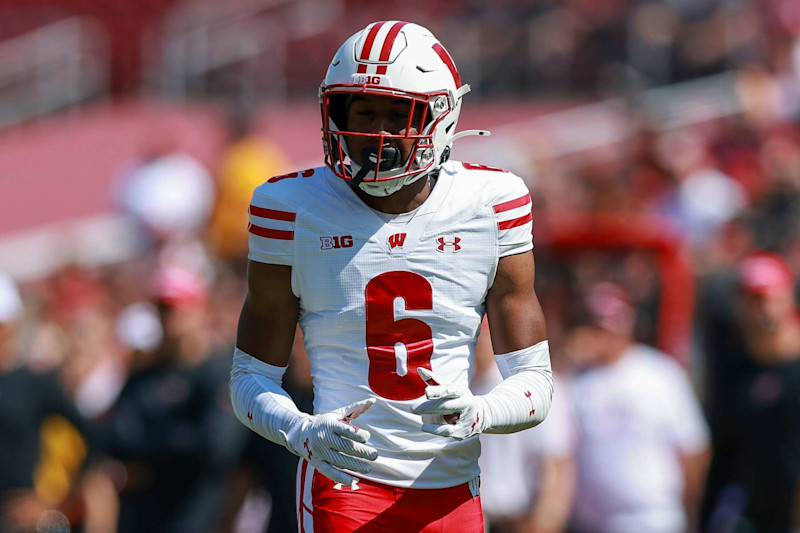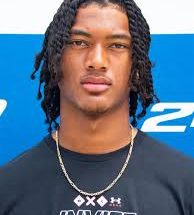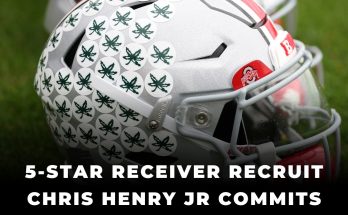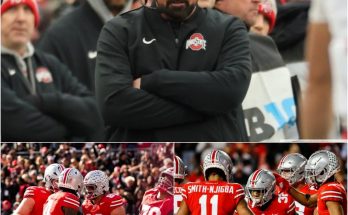Xavier Lucas’ Journey: From Wisconsin’s Refusal to Miami’s Embrace
In the ever-evolving world of college football, the player transfer portal has become an essential aspect of player movement, offering athletes a chance to pursue new opportunities or find a better fit for their talents. For some athletes, the portal is a way to escape limited playing time or to seek more competitive programs. For others, it represents a fresh start after facing challenges with previous coaching staffs or team dynamics. In this context, the story of Xavier Lucas—his journey from being refused entry into the transfer portal by the University of Wisconsin to finding a new home at the University of Miami—illustrates both the intricacies of the transfer portal system and the personal resilience of a young athlete.
A Rising Star with High Expectations
Xavier Lucas’ story in college football began with great potential. As a standout player in high school, Lucas had made a name for himself as a dynamic and versatile athlete, showcasing skills that allowed him to excel both on offense and defense. His commitment to the University of Wisconsin was seen as a significant victory for the Badgers, with many experts projecting him to be a key player in their defensive scheme.
Lucas’ physical attributes were hard to ignore. Standing at 6 feet tall and weighing 195 pounds, he had the build of a traditional cornerback but also possessed the versatility to play a variety of roles in the secondary. His speed and agility allowed him to match up against fast wide receivers, while his football IQ and ability to read the game made him a promising defensive weapon. As a result, Lucas was expected to contribute early to Wisconsin’s defense.
However, as often happens in college football, the road to stardom can be filled with hurdles, including fierce competition for starting positions, coaching changes, and even personal struggles. For Lucas, these challenges would become a significant part of his story.
Wisconsin’s Transfer Portal Controversy
The transfer portal has gained increasing prominence in recent years, and NCAA rules now allow players to enter the portal at any time during the year, giving them the opportunity to explore other programs. However, entry into the portal is not always guaranteed, especially when a program or its coaching staff refuses to grant the player’s request.
Xavier Lucas found himself in a difficult situation with the University of Wisconsin. After a year of limited playing time and feeling that his opportunities with the Badgers were running out, Lucas made the decision to explore other options. His desire to transfer was based on his need for more playing time and a better fit within a new defensive scheme that would maximize his talents. However, when he submitted his request to the Wisconsin coaching staff to be added to the transfer portal, it was met with resistance.
Despite the increasing number of players entering the transfer portal each season, many programs, particularly those with strong football traditions like Wisconsin, have hesitated to allow certain athletes to leave. The reasons for such refusals can range from a desire to maintain team chemistry to a reluctance to lose talented players who might still have potential. In Lucas’ case, Wisconsin reportedly refused to add him to the portal, citing a combination of team-building priorities and the program’s reluctance to see a promising player leave.
The refusal was particularly frustrating for Lucas, who had grown disillusioned with his role on the team. While Wisconsin’s defense remained strong, Lucas believed that his individual growth would be hindered if he stayed. He had hoped that entering the portal would allow him to pursue a new challenge and gain the playing time he sought.
This situation highlights a significant challenge within college football today: players’ rights to transfer versus the decisions of coaching staffs who are tasked with maintaining their team’s integrity. While many coaches support the freedom of athletes to find the best fit for their careers, others are more protective of their rosters, especially when they believe they have a chance to build something special in the coming seasons.
The Miami Opportunity
In the face of adversity at Wisconsin, Xavier Lucas found a silver lining in the form of an offer from the University of Miami. The Hurricanes, a program known for its strong defensive traditions and history of developing top-tier talent, presented Lucas with an opportunity that he could not ignore. Miami’s coaching staff was actively looking to strengthen its secondary, and Lucas’ skill set made him an ideal candidate to contribute immediately.
Unlike his previous experience with Wisconsin, the University of Miami welcomed Lucas with open arms. The Miami program, led by head coach Mario Cristobal, had undergone several changes in recent years and was in the process of rebuilding to return to national prominence. Lucas’ arrival was part of a larger effort by Cristobal to enhance the team’s depth and overall talent pool, particularly on defense.
For Lucas, the move to Miami represented both a fresh start and an exciting new chapter in his college football journey. Miami had a reputation for turning out professional-caliber talent, particularly on defense, and Lucas believed that joining the Hurricanes would provide him with the exposure and opportunities he needed to make an impact. He was drawn to the program’s rich history of producing NFL-caliber players, and he saw the coaching staff’s commitment to his development as an opportunity to showcase his abilities at the highest level.
Miami’s defensive coordinator, who had overseen some of the best defenses in the ACC, was especially excited about Lucas’ ability to cover multiple positions in the secondary. With his unique combination of speed, intelligence, and versatility, Lucas was seen as a player who could contribute in various roles and potentially become one of the program’s standout performers. The decision to transfer to Miami seemed like the right move for Lucas, as it offered both personal growth and a chance to compete for a starting role in one of the nation’s most competitive conferences.
What the Transfer Means for Lucas
For Xavier Lucas, transferring to Miami was not just about escaping a difficult situation at Wisconsin; it was also about seizing an opportunity for self-improvement and showcasing his talents on a national stage. Moving from Wisconsin, a program with a strong defensive reputation but limited recent success on the national stage, to Miami, a program in the midst of a rebuilding process but with a history of producing elite athletes, was a decision that demonstrated Lucas’ desire to grow as a player.
At Miami, Lucas would be joining a program that was determined to return to national relevance. Miami had invested heavily in recruiting top-tier athletes, and the coaching staff was focused on developing players who could thrive in high-pressure environments. The University of Miami’s defense had been a focal point of the program’s recruiting efforts, and Lucas’ arrival signaled that the Hurricanes were serious about strengthening their defense.
From a personal perspective, the move to Miami offered Lucas several benefits. First, he would be closer to his home in the southeastern United States, making it easier for family and friends to attend his games and support his career. Second, Lucas believed that the coaching staff at Miami would help him refine his skills and elevate his game to the next level. His ultimate goal was to position himself for a career in the NFL, and Miami’s track record of developing professional talent made it an ideal environment for him to achieve that goal.
In addition to the professional aspirations, the change in scenery allowed Lucas to develop a new mindset. His time at Wisconsin had been challenging, and the transfer gave him the chance to reset and come into a new system with a fresh perspective. Miami’s emphasis on hard work, discipline, and team-first mentality was something that resonated with Lucas, and he believed that this environment would be crucial for his growth as both a player and an individual.
Conclusion
Xavier Lucas’ journey from Wisconsin to Miami is a testament to the power of resilience and the ever-changing landscape of college football. The challenges he faced while attempting to transfer out of Wisconsin and his eventual success in joining the University of Miami serve as an example of how college athletes must navigate not only their own ambitions but also the complexities of NCAA rules, coaching staff decisions, and institutional priorities.
While his time at Wisconsin may have been filled with frustration, Lucas now finds himself in a position to shine at Miami, a program that provides him with the chance to make an immediate impact. His story highlights the importance of staying true to one’s goals and adapting to new opportunities, and it shows how the transfer portal, despite its challenges, can provide athletes like Lucas with the chance to find the right fit and build a successful career.
As Lucas embarks on this new chapter with the Hurricanes, all eyes will be on him to see how he fares in one of the most competitive conferences in college football. With his talent and determination, Xavier Lucas has the potential to become one of the standout defensive players in the ACC, making a name for himself both on the field and in the eyes of NFL scouts.
The journey of Xavier Lucas is one that resonates with many athletes in today’s world of college sports, where change is constant, and the road to success is often anything but linear. But for Lucas, his transfer to Miami is more than just a move—it is a new beginning that could propel him toward a successful future both in college football and beyond.



